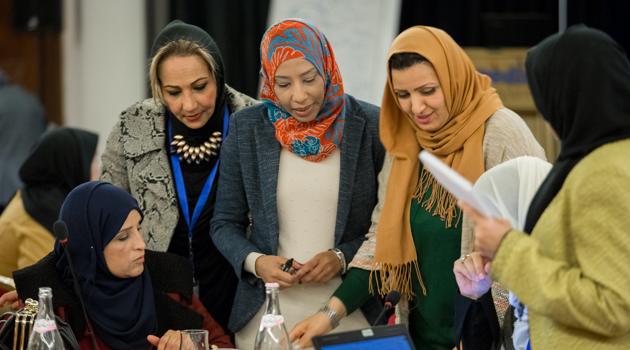“Peace is our demand: hand in hand, our love for Libya increases.”
This is just one of the peace messages that women will spread in Libya throughout the “Peace Libya campaign” that will kick off on 8 March, International Women’s Day.
Supported by the United Nations Development Programme (UNDP) in partnership with the United Nations Support Mission in Libya (UNSMIL), the campaign aims at fostering women’s role in peace building and promoting the culture of reconciliation and nonviolent co-existence.
In 2015, Libyan women from diverse and politically divided groups met in Geneva and agreed on the Libyan Women’s Agenda for Peace. As a follow up, in a conference organized by UNDP and UNSMIL in 2017 in Tunis, more than 70 women set up the way forward to campaign for peace.
“In Libya, women have the potential and the strength to play a key role toward reconciliation, but they don’t have the tools to be actively involved. The campaign is an initial step to encourage them to take the initiative in their communities to participate in political and decision-making processes.”
Ms. Karima Rajab is one of the seven women nominated during the conference held in 2017 and trained to oversee the peace activities that women from diverse backgrounds will be implementing in Misrata, Azzawya, Ubari, Tripoli, Benghazi, Sebha and Albayda, among other cities.
“The power of this campaign is that we are women from the East, West and South of Libya, facing different challenges in our regions, and within our communities, and families. We met two times, in 2015 and 2017. These was enough for us to realize that we have so much in common. What specially unites us is our desire of peace. That is the origin of Peace Libya,” explained Ms. Karima.
The campaign will be launched in Tripoli, on the occasion of International Women’s Day, targeting all Libyan population including children and youth.
Activities will take place in schools, cultural centers and universities all around Libya to raise awareness about the women peace agenda and the objectives of the United Nations Security Council Resolution 1325 on Women, Peace, and Security (UNSCR 1325).
Ms. Leila Bousif, President of Aoun organization for Human Rights in Benghazi, is also among the seven campaign focal points:
“After attending a workshop on the UNSCR 1325, I have now a better understanding of the Resolution’s goals and implementing means. I feel ready to communicate about peace and support other women to do so.”
“Peace Libya” campaign is being developed under UNDP’s Advancing Libyan Women’s Participation During the Transition’ (AMEL) project, which aims at strengthening the role of Libyan women in the political transition.
(Source: UN)





